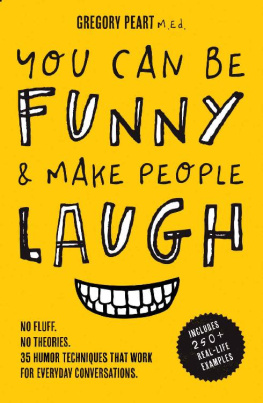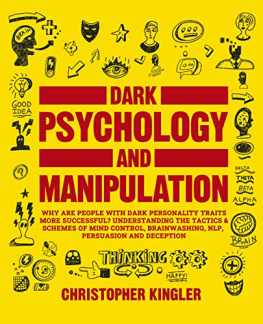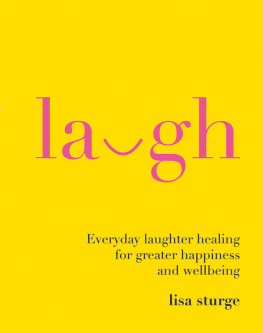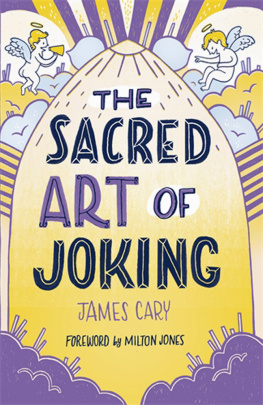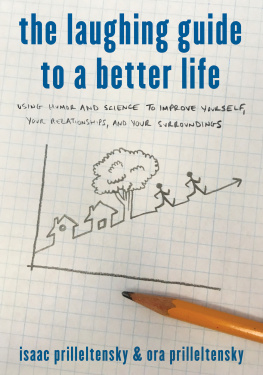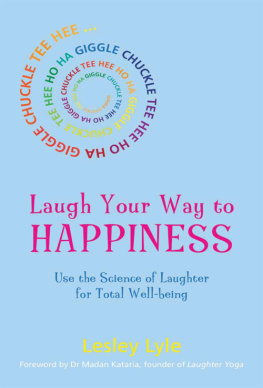HOW TO MAKE
PEOPLE LAUGH
Learn the Science of Laughter to Make a Powerful Impression, Win Friends and Improve Your Sense of Humour Even If You Dont Think Youre Funny
CHRISTOPHER KINGLER
Copyright 2021 by Christopher Kingler - All rights reserved.
The content contained within this book may not be reproduced, duplicated or transmitted without direct written permission from the author or the publisher.
Under no circumstances will any blame or legal responsibility be held against the publisher, or author, for any damages, reparation, or monetary loss due to the information contained within this book; either directly or indirectly.
Legal Notice:
This book is copyright protected. This book is only for personal use. You cannot amend, distribute, sell, use, quote or paraphrase any part, or the content within this book, without the consent of the author or publisher.
Disclaimer Notice:
Please note the information contained within this document is for educational and entertainment purposes only. All effort has been executed to present accurate, up-to-date, and reliable, complete information. No warranties of any kind are declared or implied. Readers acknowledge that the author is not engaging in the rendering of legal, financial, medical or professional advice.
TABLE OF CONTENTS
Chapter 15: People Dont Laugh at Your Jokes
What to Do?
Introduction
Many people say, keep them laughing and you might think this is as easy as telling a joke. Well, not really. It turns out that there are some secrets to telling jokes. There are certain things you need to do for your joke to get a laugh.
First, be confident with yourself and the joke youre telling. If you seem insecure, nervous, or reluctant to tell it, then they probably wont find it funny at all.
Next, get the timing right. You need to practice with this one so you can get a sense of how long you have from the point you say the punch line to when people laugh, and then you can get your timing down. In telling a joke, timing is everything. The perfect moment for a joke is when everyone is already laughing or theyve just finished laughing.
You must be in the right environment to tell a joke.. For example, if youre in a crowded room with strangers, then no one is going to appreciate your jokes. You need the appropriate environment in which to tell people your jokes. The problem with telling jokes in public is that you might make serious mistakes.
If you dont know what to say next after you tell your joke, remember that building up the level of tension while they wait for something funny to happen again will heighten their excitement when it finally does.
This doesnt mean that every time you tell a joke you have to repeat it. Sometimes you can tell a joke once, and it works well. For example, if you have just told a joke about a food item and people ask you what that is, then the best thing to do is just say Lemons. This hands down will make everyone laugh because the next time they ask, just say lemons again.
It is good to know how to tell jokes, and to talk about yourself. It is important to be able to tell a joke and be yourself when you do it.
There may be times in your life when you need to tell a joke, especially if you are among people you know. If the people around you are laughing, then what youre saying is funny. Even if they laugh at something stupid, its still good because it lets them know you can joke around and be yourself.
This is one of those things that sounds smart, but you dont have to do it. It is recommended, but thats it. You can be funny without telling a joke if you are in the mood to laugh about something that is happening in real life. People around you see that you can tell a joke when they see how funny and genuine you are.
Some people think they know how to tell a joke. They might tell you one that goes on forever, or it is a repeat of a joke that they have heard somewhere else. These are the people you should not listen to. People need to learn the difference between funny and unfunny.
In laughing at a joke that someone else tells, there is much more involved than one would think. The reason people laugh in most situations is that this person has said something that other people agree with or find relevant and they want that person to be rewarded for it. The reason people laugh is to make other people see its funny. They view this as a reward.
Some people may not laugh at everything. They might not be in the mood to laugh or they dont agree with the joke. They may have a poor attitude and not want to reward the person for telling the joke or for making fun of another person. Some people might laugh because they are nervous, or are themselves afraid of being laughed at.
One thing to remember when you tell someone a joke, is that no matter how confident you are, never tell your joke until everyone has finished laughing. This is important, because it will prevent you from telling a bad joke that no one laughs at, and never and tell a joke that you think everyone will like. Stick to jokes that are funny to you.
There is nothing wrong with laughing at someones jokes, but if you do this too much, then they might think that there is something wrong with you.
Even if you get a joke, there are still times when you shouldnt laugh at it. It is important to know which jokes to laugh at and which ones to avoid laughing at because sometimes a person will say something stupid that they think is funny. Dont laugh at such jokes. This will be embarrassing for them.
Its always important to understand when to laugh at a joke and when not to, but there is more to it than that. The way a person laughs reveals if they are laughing for the right reasons or not. Some people will try to laugh at a joke even though they dont get it. This makes them appear to be trying to gain attention.
Chapter 1: The Science
of Laughter
The science of laughter is as intriguing as it is complex. How laughter impacts our mental and physical health can affect small things, like how much you sleep at night. Innovative studies have shown that humor can provide several positive benefits. So dont be afraid to laugh!
Were going to explain what happens when you laugh, what tickles you, and why not laughing for 10 minutes equals a missed meal break.
Essentially, laughter is an emotional response to something funny, but thats not all. Its more than that, which is why understanding exactly what it can do for you is so important.
Laughter as Medicine
Well-known research on the health benefits of laughter focuses mostly on the physical aspects. The Centers for Disease Control and Prevention (CDC) recognizes laughter as part of a healthy lifestyle. A 2004 report showed that laughter can be beneficial to both your heart and respiratory system.
The way this works is through stress reduction. Laughter is a natural response that releases endorphins. These can help ease stress and promote relaxation. Laughing out loud for no reason or laughing in response to a humorous situation results in endorphin release.
The physical benefits of laughter are as crucial as the mental benefits. A good nights sleep is easier to achieve when youre in a good mood. Stress leads to physical ailments such as muscle breakdown and high blood pressure.




